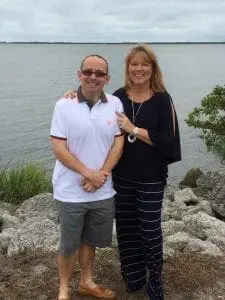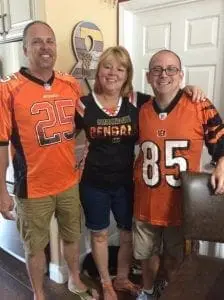Robin Raiff (Sister): He’s Not Heavy, He’s My Brother

This issue’s “Real Moms Share” is actually a “Real Sister Shares” (she happens to also be a mom). Robin Raiff was raised in Kentucky and is one of six children. Often times, but not always, in large families, kids want to leave the nest as soon as possible, and 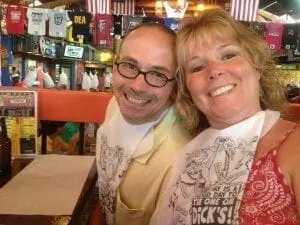 for Robin that came right after her 18th birthday. She was bound for Florida and didn’t wish to look back. For most people, that would be where the story goes cold…
for Robin that came right after her 18th birthday. She was bound for Florida and didn’t wish to look back. For most people, that would be where the story goes cold…
They would simply settle somewhere else, establish themselves, start a family and, for the most part, lead a typical, normal and happy life. End of story. Well, not so fast in the case of Robin.
A recipe for trouble and conflict
Coming from a large family, it wasn’t always an easy thing to juggle schedules, personalities, hobbies, interests or directions BUT, as Robin puts it, “when you have a very dysfunctional family unit (and aren’t most families a bit dysfunctional in some ways??) Like I had, coupled with the challenge of a younger brother (14years younger) who has been diagnosed with autism since age 5, and two parents who had their own ‘issues’, well, it is a recipe for trouble and conflict.” There was also another brother that had been in a vegetative state for quite some time. As one might imagine, the environment was not a typical one. Robin kept in touch periodically with the family back home, but it wasn’t until the early 2000’s that she knew she had to do something. On one particular trip back to Kentucky, she noticed that her brother, Michael, had become very obese and her mother had seemed “off”. As it turned out, her mother had Dementia which, in turn, became Alzheimer’s disease.
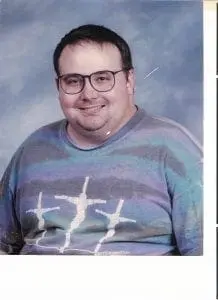 When Robin arrived at the house in Kentucky, she was struck with the certain sense that Michael, her other brother, and mother had to come back home to Florida with her. The situation had become so bad, in fact, that she had to call Adult Protective Services. Within 24 hours, she was in front of a judge who granted her temporary guardianship of her two brothers, as well as her mother. Robin summed up the need to bring them all back home this way, “I brought them down to Florida in 2002 because there was no family really close enough up there that would take care of them. And, the State of Kentucky, where they were, basically said they would become wards of the state, and I couldn’t let that happen. I brought them down here thinking I could get them on track and get them a small place, not knowing fully if Michael could ever live on his own, and then I thought Michael and my mom could get a small house together. After I got them here, however, I was told after several consults and different procedures that neither one of them were safe to live on their own, even together. Knowing my family background, I could not put either one of them in a home. I just didn’t want to do that to them, so I talked to my husband and I said, “I don’t know what else to do, but to rehab our house and make room for them and do what we can,” and that’s what we did”.
When Robin arrived at the house in Kentucky, she was struck with the certain sense that Michael, her other brother, and mother had to come back home to Florida with her. The situation had become so bad, in fact, that she had to call Adult Protective Services. Within 24 hours, she was in front of a judge who granted her temporary guardianship of her two brothers, as well as her mother. Robin summed up the need to bring them all back home this way, “I brought them down to Florida in 2002 because there was no family really close enough up there that would take care of them. And, the State of Kentucky, where they were, basically said they would become wards of the state, and I couldn’t let that happen. I brought them down here thinking I could get them on track and get them a small place, not knowing fully if Michael could ever live on his own, and then I thought Michael and my mom could get a small house together. After I got them here, however, I was told after several consults and different procedures that neither one of them were safe to live on their own, even together. Knowing my family background, I could not put either one of them in a home. I just didn’t want to do that to them, so I talked to my husband and I said, “I don’t know what else to do, but to rehab our house and make room for them and do what we can,” and that’s what we did”.
We have come a long way
Once home, however, it became very clear that something had to be done about Michael’s weight. When Michael was in Kentucky, he got to eat as much and as often as he could, literally, find food. It seemed that his main focus had become food and the computer. His parents didn’t monitor his daily actions and his diet. They were, simply, very sick and incapable of helping. When asked to explain the diet issue, Robin, matter of factly, said, “It took me a while to get him to lose weight, but he did it, and he’s been maintaining. He’s kind of edging up a little bit now, but nothing like he was. He’s lost over a hundred pounds, and he’s probably kept about seventy-five of that off, so he’s still doing well. Food and computer time are still what occupies his time the most, and when anything interferes with that, he gets frustrated, so he’s frustrated with me a lot, because I have to watch what he eats, because he’ll gain it back. He has come a long way, BUT, even at his age now (42), it takes more than one person to assist with the day-to-day issues…and there have been some ‘doosies’. Michael can ride the local transportation system here in Florida (the GoLine) and I have come to know his route driver. The driver noticed that Michael was looking through the trash at one of his stops along the route. It turned out that Michael, being a very literal and trusting person, was looking for a drink cup that a passenger discarded… thinking that he would simply drink what was left. So, thankfully, I have eyes and ears out in the real world. He was not social before, and now he’s a little bit ‘too social’. Since he’s been here, he’s also become involved in Special Olympics, bowling, track and golf. I am trying to keep him involved and out there being active because, theoretically, he’s going to outlive me, and my goal is to get him to be able to live on his own or with some type of light supervision, and we’re just not there yet.”
I know I need to get the Guardianship done…
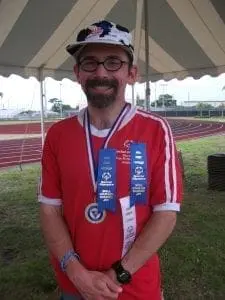 Once settled back in Florida, it became so time consuming to schedule doctor’s appointments, talk with government agencies, get medications set up and on a schedule, etc…that Robin had to make drastic changes which included even changing careers so that her time could be more flexible. Let’s face it, most employers would only be so patient with all of the time off needed to care for everyone. IN ADDITION to caring for her “new family”, she had her own family, which included three children ages 5, 8, and 18, and a husband. Robin also realized something needed to be done concerning his future. When asked about her desire to put some legal direction in place, Robin explained it this way, “I had tried for many years to speak to my parents (Dad in particular) about Michael and I was always told, basically, the most common lines: it’s none of your business, we have it handled, don’t worry about it. Well, it wasn’t handled and it needs to be handled and I am worrying about it now. I still haven’t done the guardianship yet. I know I have to do it, because technically, Michael could just say, “I want to go out on my own.” Now, he would never do that, because he doesn’t know enough to do it, but someone who wasn’t honest and on the ‘up and up’ could say, “Hey, Michael, your sister, you don’t have to live with her. You can come live with me,” and I don’t want that to happen, so I do know I have to finish the guardianship. Even when I go to the doctor’s office they all know me and they know the situation. They could tell right away that there were issues. With my mom, for example, I had power of attorney, but, with Michael, I simply go in and I say I’m his sister and they let me speak for Michael. Again, I know I do need to get the guardianship done. It’s not that I feel it’s not important, it’s time consuming, expensive to do, and then after that, you have requirements that you have to do for the state (an annual audit of all his belongings, for instance). I had temporary guardianship at first, and I just didn’t go and do the full, because it’s a lot of work and just with everything else I have on my plate, well, it’s just right now things are good, and Michael listens to me, and the doctors let me speak for him. Michael’s always in the room and they say, “Do you mind if we tell your sister,” and he says, “Yes, you can talk to her” and they give
Once settled back in Florida, it became so time consuming to schedule doctor’s appointments, talk with government agencies, get medications set up and on a schedule, etc…that Robin had to make drastic changes which included even changing careers so that her time could be more flexible. Let’s face it, most employers would only be so patient with all of the time off needed to care for everyone. IN ADDITION to caring for her “new family”, she had her own family, which included three children ages 5, 8, and 18, and a husband. Robin also realized something needed to be done concerning his future. When asked about her desire to put some legal direction in place, Robin explained it this way, “I had tried for many years to speak to my parents (Dad in particular) about Michael and I was always told, basically, the most common lines: it’s none of your business, we have it handled, don’t worry about it. Well, it wasn’t handled and it needs to be handled and I am worrying about it now. I still haven’t done the guardianship yet. I know I have to do it, because technically, Michael could just say, “I want to go out on my own.” Now, he would never do that, because he doesn’t know enough to do it, but someone who wasn’t honest and on the ‘up and up’ could say, “Hey, Michael, your sister, you don’t have to live with her. You can come live with me,” and I don’t want that to happen, so I do know I have to finish the guardianship. Even when I go to the doctor’s office they all know me and they know the situation. They could tell right away that there were issues. With my mom, for example, I had power of attorney, but, with Michael, I simply go in and I say I’m his sister and they let me speak for Michael. Again, I know I do need to get the guardianship done. It’s not that I feel it’s not important, it’s time consuming, expensive to do, and then after that, you have requirements that you have to do for the state (an annual audit of all his belongings, for instance). I had temporary guardianship at first, and I just didn’t go and do the full, because it’s a lot of work and just with everything else I have on my plate, well, it’s just right now things are good, and Michael listens to me, and the doctors let me speak for him. Michael’s always in the room and they say, “Do you mind if we tell your sister,” and he says, “Yes, you can talk to her” and they give 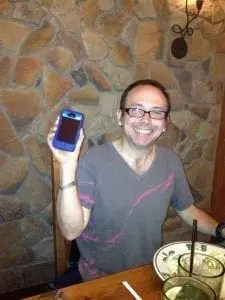 me the information. I can only do so much and I am pulled in many different directions on a daily basis.”
me the information. I can only do so much and I am pulled in many different directions on a daily basis.”
Robin feels that it does take a very concerted effort, a good network of people, a strong Faith, strong family and pain, old-fashioned “stick to it-ive-ness”. Comically she explains, “We have our moments and my husband and I think sometimes we need to be committed, but we work together and we have our faith. We rely heavily on our faith. It takes a community, so my neighbors help. My in-laws help. My church, they all know. Sometimes we wonder how we get through, and other times we’re like, “Okay. We’ve got this.” At the end of the day, when asked what her closing thoughts are and how she gets through the never ending challenges, she simply says, “No problem that can’t be solved, it does take a village and that’s how I stay sane is by sharing with my villagers! And when all is said and done, we are all in this together because that’s what family is all about each other.”![]()
Read More: Real Moms Share
https://www.parentingspecialneeds.org/article/letter-sibling-child-special-needs/
You May Also Like
- Let’s Recognize and Celebrate How Special Siblings Are
- A Letter to the Sibling of a Child with Special Needs
- Balancing the Care of Siblings with Different Needs
- Early Intervention: First Steps in the Right Direction
- I Do Not like Being a Special Needs Parent and That’s OK
- Coping with the Life You Never Imagined
- Handling Your Child’s Diagnosis: Six Things Parents Should Do For Themselves
- A Complete Guide on Positive Behavior Support for Children With Special Needs
- Family Chat: Improving Lives with Positive Behavior Support (PBS)
- 8 Ways to be a Great Advocate For Your Family Member With Special Needs
- How to Get Free From Unrealistic Expectations of Motherhood
- Father’s Perspective: Raising a Child with Special Needs
- Daddy Loves You: A Reminder for Daddies of Children with Special Needs
- Being United, Pampering, and Taking Care of Ourselves
- Avoiding the Power Struggles with Your Child
- Developing Your Own Network
This post originally appeared on our January/February 2017 Magazine


